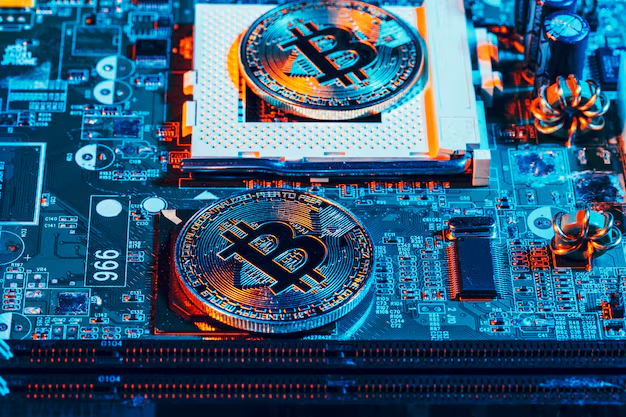Unlocking the Mysteries of Bitcoin Mining: A Comprehensive Guide
Diving into the world of Bitcoin mining might feel like stepping into a daunting, tech-heavy territory reserved for computer geniuses. However, with the right guidance and understanding, anyone can grasp the basics of this digital gold rush. Whether you're an aspiring miner or just curious about how it works, this guide will walk you through everything you need to know about Bitcoin mining.
Understanding Bitcoin Mining: The Basics
Bitcoin, often described as the original cryptocurrency, operates on a decentralized network. This means it’s not controlled by a single institution like a bank. Instead, we've got Bitcoin miners ensuring the network remains secure while simultaneously validating transactions. But what does this mean in plain terms?
What Is Bitcoin Mining?
Bitcoin mining is the process by which new bitcoins are entered into circulation and part of the maintenance and development of the blockchain ledger. Mining is performed using sophisticated hardware that solves an extremely complex computational math problem. The first computer to solve the problem receives the next block of bitcoins and the process starts again.
The Purpose of Mining
- Transaction Verification: Miners authenticate transactions on the blockchain.
- Security Enhancement: Each added block strengthens the blockchain, preventing fraudulent transactions.
- Bitcoin Circulation: Mining introduces new bitcoins into the supply pool.
Equipment and Setup Needed for Bitcoin Mining
Mining isn't as simple as turning on your computer. To be profitable, miners require specialized hardware, a stable internet connection, and a good understanding of electricity costs.
Types of Mining Hardware
- ASIC Miners (Application-Specific Integrated Circuits): These are the most efficient miners, designed specifically for hashing algorithms used in Bitcoin mining.
- GPUs (Graphics Processing Units): Originally intended for rendering video games, these can be repurposed for mining but are less efficient for Bitcoin than ASICs.
- Central Processing Units (CPUs): The least efficient method for mining Bitcoin, now mostly obsolete in this space.
Setting Up Your Mining Operation
Location Considerations
- Electric Cost: Ensure your location offers a competitive electricity rate, as mining is energy-intensive.
- Cooling Requirements: Your hardware will generate significant heat. Maintain a temperature-controlled environment.
Network and Software Setup
- Stable Internet Connection: A constant, reliable connection is vital to avoid losing mining time.
- Mining Software: Once you've chosen your hardware, the next step is to install mining software, which acts as an interface for your rig and the Bitcoin network.
Joining Mining Pools
What Are Mining Pools?
Mining alone is challenging due to the competition and resources required, hence the creation of mining pools. These are groups of miners who collaborate to mine Bitcoin and share the rewards.
Pros and Cons of Mining Pools
Advantages:
- Increased Odds: Pooling resources enhances the chances of successfully mining a block.
- Consistent Payouts: Pools offer smaller, more frequent payouts.
Disadvantages:
- Fees: Mining pools charge a percentage of your earnings.
- Less Control: Pool managers make decisions about operations and distribution of tasks.
Calculating Profitability
Not all Bitcoin mining ventures are profitable, especially when factoring electricity costs, hardware expenses, and mining difficulty.
Factors Influencing Profitability
- Bitcoin's Market Price: Profitability aligns with Bitcoin's fluctuating value.
- Difficulty Rate: The increasing difficulty of mining affects the speed of finding a new block.
- Operational Costs: These include hardware costs, electricity, and maintenance.
Using Mining Calculators
Mining calculators help estimate potential profits based on current Bitcoin prices, miner performance, and energy costs. Input factors such as hash rate, power consumption, and electricity price to get a clearer picture of profitability.
The Environmental Impact of Mining
Bitcoin mining raises concerns due to its environmental impact, mainly due to high electricity consumption and electronic waste generation.
Energy Consumption
- Renewable Energy Initiatives: Some operations have moved to use more sustainable energy sources, like hydroelectric and solar.
- Efficiency Improvements: Technological advancements aim to reduce energy usage per mined Bitcoin.
Waste Concerns
As technology improves, outdated mining equipment contributes to electronic waste. Responsible recycling and disposal practices are crucial for sustainability.
Future Trends in Bitcoin Mining
Bitcoin mining is evolving, driven by technological advancements and regulatory changes.
Technological Advances
- ASIC Development: New ASIC designs promise higher efficiency and lower power consumption.
- Quantum Computing: Potential to revolutionize mining with enhanced computational power.
Regulatory Implications
- Global Regulations: Mining operations may need to adapt as countries introduce new laws affecting energy usage and cryptocurrency handling.
- Decentralization Efforts: There's a growing emphasis on decentralizing mining operations to maintain Bitcoin's core principle of decentralization.
Visual Summary: Key Points About Bitcoin Mining
Here's a quick breakdown for easy reference:
🔍 What Is Bitcoin Mining?
- Processes transactions
- Secures the network
- Introduces new bitcoin
⚙️ Key Equipment
- ASICs for efficiency
- Reliable internet
- Cooling systems
🤝 Benefits of Mining Pools
- Enhanced odds
- Regular payouts
💡 Profitability Considerations
- Market price impact
- Operational costs
- Use calculators for estimates
🌍 Environmental Impact
- High energy use
- E-waste concerns
- Shift towards renewables
🔮 Future Trends
- Tech advancements
- Regulatory changes
- Decentralization focus
Embarking on a Bitcoin mining adventure demands an understanding of multiple components, including hardware, software, electricity usage, and market trends. However, with this guidance, you're better equipped to understand and navigate the complexities of Bitcoin mining. Whether you aim to simply gain insights or actively participate, this knowledge empowers you to make informed decisions in this dynamic field.

